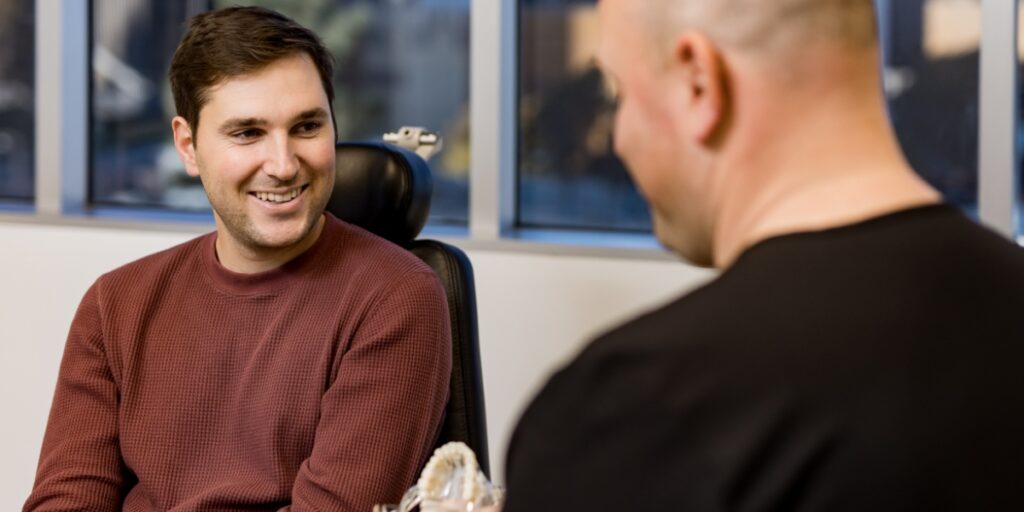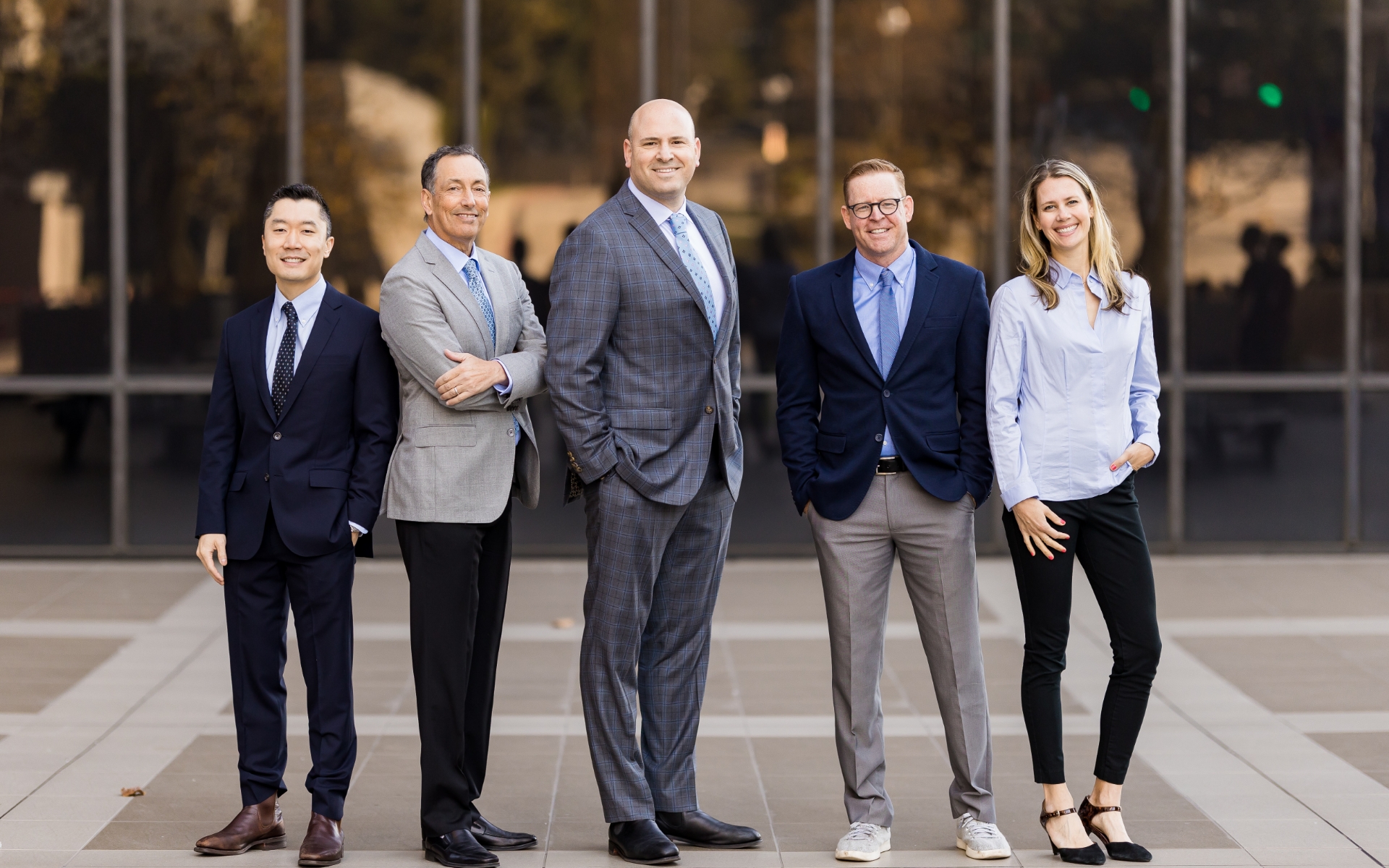Los Angeles Center for Oral & Maxillofacial Surgery is unique in that we have on-site anesthesiologists to support our trained and experienced oral surgeons. All oral surgeons undergo rigorous anesthesia training, but having a separate anesthesiologist allows your surgeon to focus fully on the procedure at hand. This emphasis on safety led to our receiving Joint Commission accreditation for surgical care in an office setting. All of our facilities are equipped with the most reliable monitoring equipment for your safety and comfort.
Our anesthesiologists and oral surgeons are trained to administer all forms of anesthesia. So we can accommodate patients of all ages, our staff is also trained in pediatric care to ensure that your child is safe and comfortable when they need dental or surgical care. When you come in for your pre-surgery consultation, your surgeon will discuss your anesthesia options and help you choose the right one for your procedure. Below are some brief descriptions of the different forms of anesthesia we provide at our practice:
- Local anesthesia is a shot that numbs the area of the procedure and prevents pain. Patients who have had fillings or other minor dental procedures may have previous experience with local anesthesia. If local anesthesia is the only form of anesthesia used for your procedure, you will remain fully awake throughout. You may eat a light meal before your procedure, and you will be able to drive yourself home afterward.
- Nitrous oxide gas is often used to reduce pre-surgery anxiety. Sometimes, nitrous oxide and local anesthesia are used together to help patients stay calm and comfortable throughout their procedure.
- IV sedation allows patients to enter into a sleep-like state. Patients who undergo IV sedation often find that the procedure is over before they know it has begun. You may not eat or drink anything for at least eight hours before having IV sedation, and you will need a responsible adult to drive you home after your appointment.
- IV general anesthesia is used for patients with more anxiety and more complex procedures. Patients who undergo general anesthesia will be unconscious during surgery, and a separate anesthesiologist will do the anesthesia. Your surgeon will not be doing your surgery and general anesthesia at the same time. Patients cannot eat or drink for at least eight hours before their procedure.
- Inhalation induction general anesthesia is used for patients with a fear of needles. This is often the anesthesia of choice for our pediatric patients. In those circumstances, we allow parents to enter the operating room during this process. Patients who undergo inhalation induction general anesthesia will be unconscious during surgery, and a separate anesthesiologist will do the anesthesia. Your surgeon will not be doing your surgery and general anesthesia at the same time. Patients cannot eat or drink for at least eight hours before their procedure.
Exparel® for Extended Pain Relief
Our trusted doctors use the most advanced techniques for improving their patients’ surgical experience before, during, and after oral surgery. One of the greatest concerns medical professionals are faced with these days is how to provide effective pain management to their patients without the risks associated with prescribed opioid medications. We are proud to offer Exparel to our surgical patients at our Los Angeles, CA, office. Exparel is a non-addictive, opioid-free pain control medication that is administered by your oral surgeon in a single dose during surgery. It is both proven and effective. This type of long-acting, non-opioid pain management medication is designed to control pain for several days post-surgery and is quickly becoming the preference for doctors as well as patients.
Why Are Opioid-Based Pain Medications Risky?
Opioid-based prescription pain medications, also called narcotics, are very similar to the illegal drug heroin in terms of how they work and their effects on the human body. These addictive medications can have grave side effects if they are not used properly. Prescription opioid-based drugs include
- Codeine (only available in generic form)
- Fentanyl (Actiq®, Duragesic®, Fentora®, Abstral®, Onsolis®)
- Hydrocodone (Hysingla ER®, Zohydro ER®)
- Hydrocodone/acetaminophen (Lorcet®, Lortab®, Norco®, Vicodin®)
- Hydromorphone (Dilaudid®, Exalgo®)
- Meperidine (Demerol®)
- Morphine (Kadian®, MS Contin®, Morphabond®)
- Oxycodone (OxyContin®, Oxaydo®)
- Oxycodone and acetaminophen (Percocet®, Roxicet®)
The standard treatment for post-surgical pain relief is to prescribe opioid medication even though these medications have a high risk of dependence. The result of this healthcare trend is that we now have a troubling opioid crisis in our country — more than 115 Americans die each day from opioid overdose and 1 out of 15 surgical patients turns to long-term opioid use after surgery. By offering effective non-opioid pain control, the doctors at our Los Angeles Center for Oral & Maxillofacial Surgery office aim to keep their patients safe from the risks that opioid medications carry while keeping them comfortable and at ease.
How Does Exparel Work?

During surgery, your oral surgeon will administer Exparel directly to your surgical site. The medication works by numbing the pain with a slow release of bupivacaine, an opioid-free local anesthetic. This slow release of anesthetic medication allows Exparel to provide continuing pain relief after surgery with just a single dose. Exparel continues to provide relief during the recovery period, often successfully managing pain for several days. Some of the benefits of Exparel include
- Lasting pain relief in a single dose. Clinical trials have shown that patients who received Exparel during their procedure experience pain relief for several days after post-surgery. Many patients who opt for Exparel will not need to use an opioid medication — their pain will be managed throughout their recovery with Exparel alone.
- Non-addictive. Exparel offers highly effective pain management without the risk of dependence. Exparel is not an opioid/narcotic and is not addictive.
- No prescriptions to fill. Exparel is administered during your surgical procedure and continues to offer relief in the days after surgery while you recover, so you are less likely to be bothered with the inconvenience and expense of prescription medications.
- Less risk of side effects. Exparel is administered in a single dose, limiting the amount of medicine you need and therefore limiting the risk for side effects.
Opting for Exparel during your surgical procedure can provide long-lasting pain control and reduce the need for opioid medication after your oral surgery. For more information on how Los Angeles Center for Oral & Maxillofacial Surgery can help make your surgical experience the safest it can be, please give us a call to schedule a consultation. Drs. Relle, Kupferman, Walline, Lee, Sonnichsen, Caroline are happy to talk with you about adding Exparel to your surgical treatment plan.
Anesthesia at Los Angeles Center for Oral & Maxillofacial Surgery
Our office in Los Angeles, CA, is held to the same standards as hospital operating rooms. Whether you are having a simple tooth extraction or an extensive jaw surgery, you can rest assured that our surgical and anesthesia staff are doing everything they can to make sure your procedure goes as smoothly as possible.
If you have questions about your anesthesia options, one of our staff members or oral surgeons will be happy to speak with you and answer your questions during a consultation appointment. Your safety, comfort, and care are our top priorities, and our staff will do everything we can to make you feel comfortable and prepared for your procedure.
Request Appointment
To request a consultation and learn more about our services, please request an appointment now. We look forward to helping you improve your oral health and smile! Call us at (310) 842-4811.
